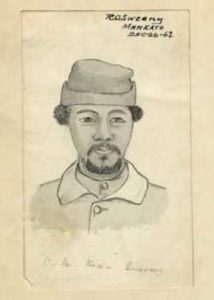
Joseph Godfrey
*The birth of Joseph Godfrey is celebrated on this date in 1835. He was an enslaved Black man and a Dakota fighter.
Joseph Godfrey was born into slavery in Mendota, Minnesota. He was the son of a French-Canadian voyageur named Joseph Godefroi and Courtney, an enslaved African woman brought from St. Louis, Missouri, to Fort Snelling by a U.S. Army officer. Godfrey was raised in Alexis Bailley's home, where his mother worked. His mother was sold south again (without him) when he was five. She eventually sued for her freedom for being held as an enslaved person in the Northwest Territory, where slavery was illegal, and won. Little is known about his childhood, except that he received very little formal education.
Godfrey was taken to St. Paul, Minnesota. During this time, he served as an aide to Henry Hastings Sibley, a trader and later the first governor of Minnesota. Suffering beatings from his owners, Godfrey ran away and found refuge among the Dakota tribe as a fugitive slave. In 1857, he moved to the Lower Sioux Agency in Redwood County, MN. There, he married the daughter of Wahpaduta (Red Leaf). In August 1862, while helping local Dakota load hay onto a wagon, Godfrey was approached by another Dakota man announcing that all the white people had been killed at the agency. On the spot, Godfrey was asked what side he would take. Because of his family, Godfrey felt compelled to join the war.
"Slayer of Many"
Later that fall, Col. Sibley accused Godfrey of joining the Dakota between August 19 and September 29 and actively participating in attacks. Dakota warriors awarded him the name "Atokte," meaning "slayer of many" in the Dakota language; however, there were conflicting reports about his role in the conflict and the extent of his involvement. Testimony and pardon, Godfrey was captured after the Battle of Wood Lake on September 23, 1862. He was the first person tried by the military commission on September 28, 1862.
To escape execution, Godfrey testified against eleven of the thirty-eight Dakota warriors hanged on December 26, 1862. Although he escaped murder, he was convicted of participating in the fighting and sentenced to hang. In exchange for his testimony, the commission recommended that the President commute his sentence to ten years' imprisonment. In its recommendation to President Abraham Lincoln, the court commission stated that "many men of the very worst character would have gone unpunished" without Godfrey's testimony. Lincoln agreed to the commutation and later issued a full pardon.
Godfrey was sent to Camp McClellan in Davenport, Iowa, to serve his prison sentence. After serving three years, he was pardoned and freed in 1866. Upon his release, he settled on the Santee Sioux Reservation in Nebraska. Godfrey spent the rest of his life on the Santee Reservation and died there from natural causes in July 1909. His body was buried in the Episcopalian Cemetery on the reservation.